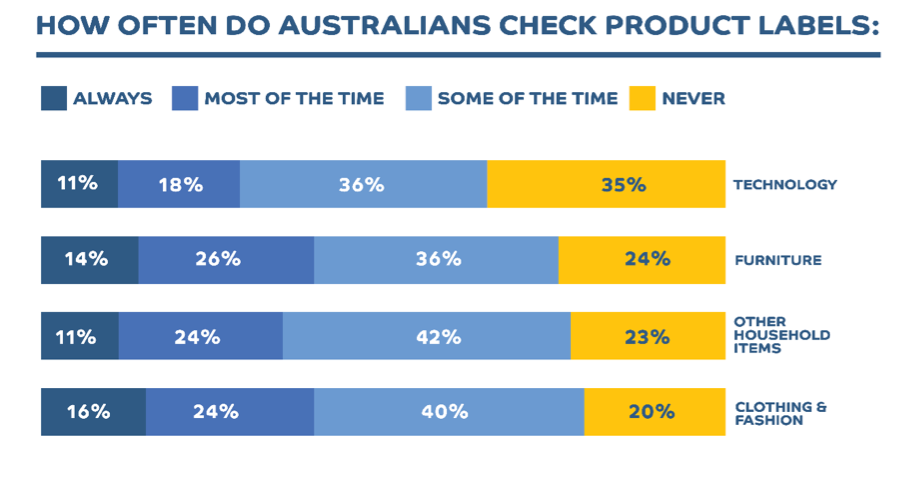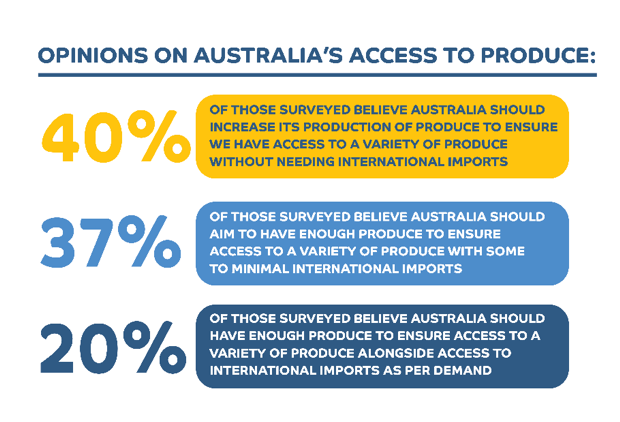Are Australian’s re-evaluating their shopping habits to include more Aussie-made products? Or does the cheapest option always win?
When it comes to shopping Aussie-made products, the popular attitude is that buying Australian-made is always the superior choice, and more and more Australians may hold this view because of recent events. But are Aussies ready to give up choice when it comes to their purchases? And are they willing to pay more for products to support the cause?
Having our (Aussie-made) cake and eating it too…
The vast majority of surveyed Australians feel that it is important to support local businesses, either in person or online (97%). Aussies are particularly supportive when buying produce, with 69% stating it was very important to them to buy home-grown when shopping at the supermarket or local grocery stores. As expressed by one respondent; “It is important to support local growers and manufacturers so they can remain competitive and provide local jobs, which in turn supports communities and families”.
However, this does not necessarily mean we don’t also want the choice of the world’s offerings as well. Of those surveyed, there was equal agreement for the need to have access to both produce that has been grown in Australia and that is imported; as one respondent expressed, “We can’t grow everything, we have neither the climate nor knowledge nor market to do so. A limit on choice is never a good thing” Around 65% stated that they find it important to have access to international online stores and products. Unsurprisingly this attitude was age-affected, with younger age groups much more likely to consider this to be very important, and older Australians finding the need to shop online from overseas not so necessary.

For other retail, such as home, furniture and technology products, the majority do state that it’s very important to buy Australian made (57%). We are of course limited in what products are currently manufactured here, and Aussies have grown accustomed to an increasingly accessible world market, which would be difficult to give up, or imitate locally. As one respondent put it, “We can’t put up a fence around Australia and not let people be able to choose what they want from around the world. It’s up to Australia to ensure that we produce high quality goods at a reasonable price”.
Naturally, when shopping for groceries the most important consideration for Australians polled was price. But remarkably, the next most important factor listed was not the brand or even the look or feel of the produce, but whether it was Australian made or grown. This shows the complicated intentions of Aussie shoppers, searching to both support Australian products (often more expensive for some items) and simultaneously get the cheapest options. A similar finding applied to the purchases of other retail products. It seems that Australians want to have our cake and eat it too when it comes to spending on produce and products while supporting Aussie-made goods.
Putting our money where our mouths are…
Australians may adamantly support a preference for buying Australian-made, but in day-to-day living what actions do we take to hold ourselves accountable to this view? When asked about how often they check the product labels on grocery items to determine whether it’s Australian made, 24% of respondents declared they do this all the time, and a further 40% stated they do this most of the time. Of the remaining, 30% do so some of the time, and only 6% never check product origins of their groceries.
Looking at specific types of groceries, Aussies are most likely to check the origin of fruit and vegetables, and meat and seafood (73% stated they check ‘most or all of the time’ for both categories). As one respondent explained, this can be a way to gauge produce quality – “It is healthier for us to be eating fresher produce that hasn’t been stored whilst being transported from afar”.
In contrast, only half of Aussies polled check the origin ‘most or all of the time’ for household products such as cleaning agents, toilet paper, and tissues, and 18% do not ever check. Perhaps this partially explains the unwarranted panic-buying of toilet paper earlier in the year, occurring even though nearly all of Australia’s toilet paper is produced locally. For pantry items such as cereals, spreads, and sauces, around 61% check the product origin ‘most or all of the time’ and only 8% do not check.

When it comes to retail products outside of the grocery aisles, Aussies are much less likely to check the origin of products. It could be assumed that many Aussies are not checking origins because they feel they already have a fair idea that the product isn’t manufactured in Australia, based on the type of product and the retailer. For example, 35% of Aussies polled never check the labelling on technology products, 24% never check for furniture, 23% never check other household items such as décor, and 20% do not check the labelling on clothing items.

However, for those who are checking (at least some of the time) the knowledge of a product not being Australian-made is only likely to affect the purchasing decision of around 37%. This leaves a large portion of Aussies polled declaring that while they do check the origin of these products, the fact that it was manufactured overseas does not deter their purchase. In some product categories there is a lot of choice – but you can’t buy an Aussie-made option if there is none, and some respondents argued that even if there is an Aussie option, it just might not be the one you want.
The effects of the pandemic on how we will shop in the future…
While a preference for Australian products may have always been a common mindset, the global pandemic has further brought into focus the supply-chain factors of where we get our products from. Prior to their experiences in 2020, around 82% of Aussies polled were likely to purchase Australian-made grocery items, but now 91% believed they would be likely to in the future. Not only has the effects of 2020 influenced more people to shop Australian-made, but the ways in which we shop have changed as well. Approximately half of respondents have used an online order service for their grocery shopping, and of those 1 in 2 people stated that they will now be likely to continue to do so even once Australia’s COVID related situation normalises or a vaccine is introduced.
Australians have not only adopted online ordering when it comes to grocery shopping. During times of severe ‘lockdown’ measure this year, other retailers have been forced to close physical stores and only provide products to purchase through online ordering. Around 8 in 10 Aussies polled stated they would be likely to purchase Australian-made retail products in the future, compared to 6 in 10 prior to 2020. In contrast to grocery shopping, while a great number of Aussies have been more likely to turn to online ordering for retail products, the majority stated they would not be likely to utilise this shopping method in the future (53%). The main reason provided for this thinking was that it is easier to see the quality of the product or try it out/on when physically present in a store (87%).
Australia’s self-belief to become self-reliant…
International supply shortages throughout this year have created the potential advantage for Australian-made products and produce to become household substitutes. Even if some find it hard to choose Australian-made over price, the vast majority are of the mindset that supporting Australian products is for the best. When asked about the impact of the country having had a reduced access to international produce of late, 80% of Aussies polled thought this was a beneficial outcome for Australians going forward; as expressed by one respondent, “It’s a positive in the long term because it is making us realise we need to manufacture/produce more domestically. Australia is too reliant on international goods”.
Similarly, when asked the same of other products, such as furniture and tech products whose overseas production has experienced delays, 68% of Aussies polled thought this would also result in a positive situation for the country in the future. But what does going forward in this way look like?

Around 35% of Aussies believe that when it comes to products such as furniture and technology, Australia should move towards having enough Aussie-made products to ensure access to a variety without the need for international goods. A further 37% agree we should expand locally made offerings as well as access to some to minimal international imports. But when even quintessentially Aussie companies, such as mattress brand Koala, are shifting their manufacturing from here to overseas, consumers with this mindset might find that suppliers can’t (or won’t) adjust to this philosophy.
A show of support for an exclusively Aussie-produced future was also found for grocery items – 40% declaring Australia should increase production to ensure our needs can be met without international imports, and an additional 37% agreeing but including some minimal imports.
Nearly 9 out of 10 Australians polled believe that there is a need for Australia to put funds and effort into becoming self-reliant (87%). The most cited reason for this attitude is to increase work opportunities here in Australia (83%). Also noted was the reason to safe guard our future access to products and resources (78%).
There may be many factors to consider in our goals to move towards more self-sustained markets, and increased support for Australian production. Reaching these goals will not only allow the nation to be less reliant on imports, and therefore less vulnerable to issues arising from global events (such as pandemics and natural disasters) but in turn, supports local business, local jobs and the future of a healthy thriving Australian economy. These shifts may come slowly than some would like, but at least recent events have brought these ideas to attention, and discussion may lead to a more balanced variety of quality products available in Australia, from Australia .
768 Australians were polled in September 2020 on our consumer panel Select Opinion Leaders.
